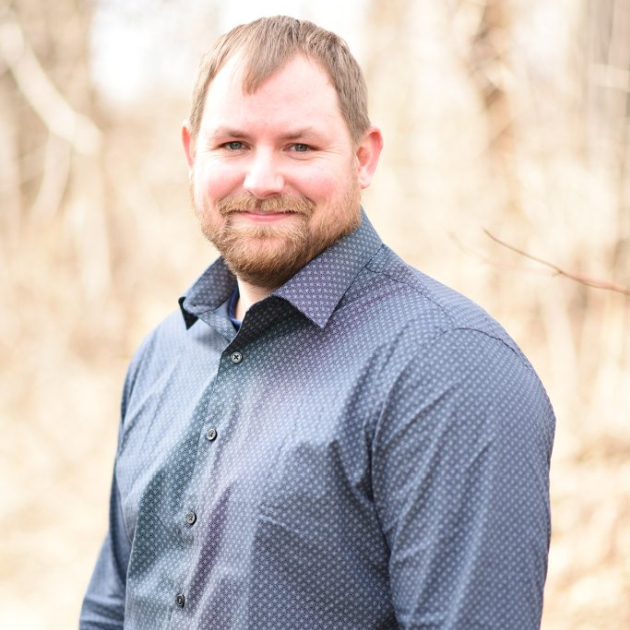Kevin Stromberg, ’08, M.S.Ed. ’10, Guides Trauma Survivors as Clinical Director of Counseling Works
By Eva Richards
 Kevin Stromberg's experience during the Feb. 14, 2008, shooting on NIU's campus cemented his decision to become a therapist and work with trauma survivors.
Kevin Stromberg's experience during the Feb. 14, 2008, shooting on NIU's campus cemented his decision to become a therapist and work with trauma survivors.
Growing up in the northwest suburbs of Chicago, Kevin Stromberg, ’08, M.S.Ed. ’10, played a variety of sports, including water polo. He worked as a lifeguard and swim instructor throughout most of his high school career, and those roles helped grow an interest in becoming a teacher—until a course changed his mind.
“Throughout most of high school, I had wanted to be a teacher. I had received positive feedback as a swim instructor,” Stormberg said. “That all changed when I took a psychology class in high school. As I learned more about the fields of psychology, counseling and social work, I knew I wanted to be a therapist instead.”
Stromberg initially transferred to NIU from Michigan State University during his sophomore year of college. His mother was ill at the time, and he wanted to be closer to home. He enrolled in courses and continued to pursue a B.S. in psychology.
“I had some amazing professors in my undergrad years who really kept my passion for wanting to become a therapist,” he said. “Their knowledge and passion were evident.”
However, Stromberg’s life was forever changed on Feb. 14, 2008, when five fellow students were killed and 21 were wounded in an on-campus shooting. Stromberg experienced the trauma in the Cole Hall classroom first-hand, and it impacted the way he saw his future career as a therapist.
“This experience cemented my decision to work towards becoming a therapist and that I wanted to work with trauma,” he said. “I could not imagine others, especially kids and adolescents, going through a traumatic experience and feeling as if no one was there or that no one would listen. After the tragedy, I gained a stronger sense of community, which becomes increasingly important when working with trauma.”
Stromberg’s personal experience has given him insight and understanding into the complexity of trauma and the symptoms others may experience. After earning his B.S. in 2008, he decided to stay at NIU to pursue his M.S.Ed. in counseling.
“During grad school, the professors put a lot of emphasis on being involved in professional organizations, pursuing your licensed clinical professional counselor (LCPC) license, being an agent of change, being a well-informed consumer of information, and being open to continuing to grow and learn,” he said.
Together, Stromberg’s classroom education and personal trauma prepared him to help others.
“Most importantly, it shaped my understanding of safety and the need to feel safe. I do have to be aware of my responses, biases and blind spots when working with trauma, as my experience is not necessarily the experience of others. This is especially where community and access to resources comes into play,” he said.
In addition to his personal experiences, Stromberg completed an internship with Victims of Domestic Violence while on campus.
“I was the organization's first male therapist. I really understood, then, what it meant to be an agent of change and advocating,” he said.
Upon graduation, Stromberg in 2008, offered a job as a therapist at Residential Treatment Facility in Addison, Illinois, where he worked with a dozen adolescent males, ages 12-16, with extensive trauma histories and behavioral issues. These clients were also Department of Child and Family Services wards of the state.
“It was a challenging environment and one I never thought I would work in,” he said. “This pushed me to really understand the impact of my own trauma and being aware how that could come out in a therapy session with my clients. It also deepened my understanding of complex trauma and the challenges many individuals face.”
Stromberg was soon promoted to senior clinician after passing his test to become a licensed clinical professional counselor. That gave him the opportunity to work within a leadership capacity, providing supervision to therapists while also working with clients. After five years, Stromberg joined a new practice embedded within a psychiatry practice that was part of a large hospital system. Starting off as the first full-time therapist at one location, he eventually was promoted to lead clinical therapist and worked alongside his supervisor on projects related to program growth and development while also maintaining a client caseload. Upon his departure just over six years later, the department had grown to seven locations and over 50 therapists.
In April, Stromberg joined Counseling Works as its clinical director, where he works as a therapist and in administration for the Naperville and Lemont, Illinois, offices.
“I enjoy seeing clients as it allows me to stay current with my clinical skills. This helps me when providing supervisions and consultations. One of the best parts of my job is knowing that I am supported by other members of the leadership team. It is refreshing to know that my ideas and ideas from the clinical team will be heard,” he said.
Since he started, Stromberg has worked to create and implement an internship program. This exciting program has made setting boundaries with his time more important than ever, especially as he helps young people find their path in counseling.
“I love working within a dual capacity. Seeing clients allows me to continue to pursue my clinical passions and keep my skills fresh. Being the clinical director allows be to provide supervision to interns and new therapists,” he said. “It gives me the opportunity to consult, learn and grow with seasoned therapists, as well. I had some excellent supervisors during my career and some not-so-great supervisors. I have tried to model my supervisory style off the ones I believed did a great job. Being a therapist is awesome, as I get to help people see and realize their growth, resiliency and potential.”
Stromberg has shared his story in ways, too, presenting at an Illinois Anti-Terrorism Task Force conference, as well as two different school board meetings. In all three instances, he shared his story and how the experience shaped his career early on.
Even with the obvious and painful challenges during his college experience, Stromberg looks back at his time at NIU with fondness.
“Several of my professors, in both degree experiences, were invested and passionate about the field," he said. "That made learning both challenging and enjoyable, as we would tackle difficult topics and conversations. In grad school the emphasis on continued personal and professional growth really resonated with me and has pushed to work on myself in both areas. (My professors had) a roadmap for success. I strongly believe that the education I received has shaped my career.”
